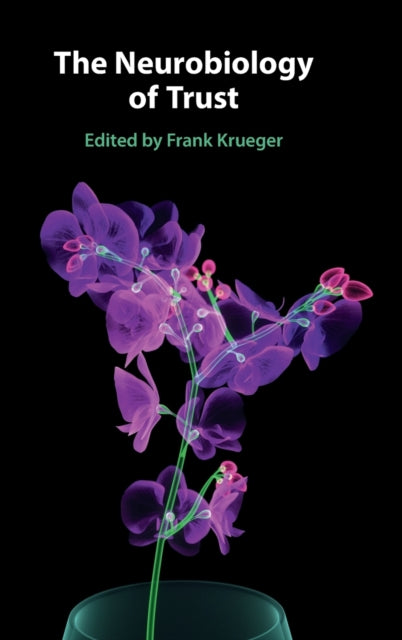Shulph Ink
The Neurobiology of Trust
The Neurobiology of Trust
YOU SAVE £2.00
- Condition: Brand new
- UK Delivery times: Usually arrives within 2 - 3 working days
- UK Shipping: Fee starts at £2.39. Subject to product weight & dimension
Bulk ordering. Want 15 or more copies? Get a personalised quote and bigger discounts. Learn more about bulk orders.
Couldn't load pickup availability
- More about The Neurobiology of Trust
This book explores the neurobiological underpinnings of trust, focusing on empirical, methodological, and theoretical aspects, and is written by a distinguished group of researchers from economics, psychology, human factors, neuroscience, and psychiatry.
Format: Hardback
Length: 550 pages
Publication date: 16 December 2021
Publisher: Cambridge University Press
Trust is a fundamental cornerstone for fostering and sustaining cooperative behaviors among individuals and institutions across diverse social, economic, and political realms. In this comprehensive book, we delve into the intricate world of trust, employing a neurobiological lens to explore its empirical, methodological, and theoretical dimensions. Comprising contributions from esteemed scholars hailing from economics, psychology, human factors, neuroscience, and psychiatry, the chapters herein shed light on the neurobiological foundations of trust as they apply to various domains. By delving into these essential topics, researchers and students alike will gain a refined understanding of trust, as outlined by the foremost experts in this field.
The significance of trust cannot be overstated, as it plays a pivotal role in shaping our interactions, relationships, and overall well-being. Trust is a complex construct that arises from a combination of factors, including past experiences, social norms, and individual characteristics. It serves as a foundation for mutual understanding, cooperation, and collaboration, enabling individuals and organizations to achieve their goals and aspirations.
In the realm of economics, trust is a critical component of market transactions and economic growth. Trust between buyers and sellers fosters efficient markets, where prices reflect true value and transactions can occur smoothly. Trust also plays a role in developing long-term relationships, which can lead to increased investment, innovation, and job creation.
In the social context, trust is essential for building and maintaining strong relationships. Trust between individuals, families, and communities promotes social cohesion, empathy, and support. It enables individuals to share information, resources, and experiences, fostering a sense of belonging and well-being. Trust also plays a crucial role in conflict resolution, as it allows individuals to find common ground and work towards mutually beneficial solutions.
In the political realm, trust is vital for establishing and maintaining democratic institutions. Trust between citizens and their government is essential for the functioning of democratic systems, as it enables citizens to participate in the political process, hold their leaders accountable, and engage in meaningful dialogue. Trust also plays a role in international relations, as it enables countries to cooperate and resolve conflicts peacefully.
Given the importance of trust, it is crucial to understand its neurobiological underpinnings. The brain is a complex organ that plays a crucial role in the development and maintenance of trust. Research has shown that trust is influenced by a variety of factors, including genetics, brain structure, and neurotransmitters. For example, studies have shown that individuals with a certain genetic variant are more likely to trust others, while brain imaging studies have revealed that certain regions of the brain are activated when individuals trust or distrust others.
In addition to its neurobiological foundations, trust also has methodological and theoretical implications. Methodologically, trust is a challenging concept to measure and study, as it is a subjective experience that can vary across individuals and contexts. Therefore, researchers must employ a variety of methods, such as surveys, interviews, and experimental studies, to capture the nuanced nature of trust. Theoretically, trust has been studied from various perspectives, including social psychology, economics, and neuroscience. These perspectives offer different insights into the nature and dynamics of trust, and can help researchers develop new theories and models to explain its development and maintenance.
In conclusion, trust is a fundamental aspect of human interaction and plays a crucial role in shaping our social, economic, and political lives. This book explores trust through a neurobiological lens, shedding light on its empirical, methodological, and theoretical dimensions. By delving into the essential topics in this area of study outlined by leading experts, researchers and students alike will gain a refined understanding of trust, as outlined by the foremost
foremost experts in this field. As we continue to navigate the complex and interconnected world we live in, understanding and fostering trust will be essential for building a more resilient, inclusive, and prosperous society.
Weight: 853g
ISBN-13: 9781108488563
This item can be found in:
UK and International shipping information
UK and International shipping information
UK Delivery and returns information:
- Delivery within 2 - 3 days when ordering in the UK.
- Shipping fee for UK customers from £2.39. Fully tracked shipping service available.
- Returns policy: Return within 30 days of receipt for full refund.
International deliveries:
Shulph Ink now ships to Australia, Belgium, Canada, France, Germany, Ireland, Italy, India, Luxembourg Saudi Arabia, Singapore, Spain, Netherlands, New Zealand, United Arab Emirates, United States of America.
- Delivery times: within 5 - 10 days for international orders.
- Shipping fee: charges vary for overseas orders. Only tracked services are available for most international orders. Some countries have untracked shipping options.
- Customs charges: If ordering to addresses outside the United Kingdom, you may or may not incur additional customs and duties fees during local delivery.


